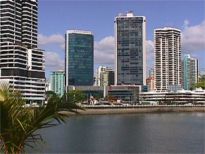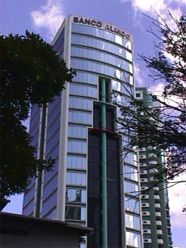 |
|
|
BACKGROUND
In addition to the famous Panama Canal, Panama is an
international center for banking, insurance,
finance and shipping. Hundreds of thousands of individuals
and companies from around the world have established
Panamanian Offshore Corporations here, and enjoy
Panama’s offshore tax free status and strict
regulatory and confidentiality protection.
Panama’s offshore corporate legislation is a hallmark of
well established jurisprudence and is
recognized around the world for its
legal precedence, stability, and high degree
of confidentiality.
ADVANTAGESJust like U.S. and other nations’ corporations, Panamanian Offshore Corporations are proven legal entities utilized by hundreds of thousands of individuals and companies around the world for transacting business.
However, unlike many other nations, the Republic of Panama
levies no taxes on foreign income derived
from corporate activities, nor does it tax interest income
generated from corporate monies deposited in Panamanian banks.
Panama only
The Corporation is duly registered
in Panama’s Public Registry, thus ensuring its legal status.
The Corporation’s stock may be issued to the bearer, thus
ensuring the owner’s confidentiality.
Disclosure of ownership is not required under Panamanian law.
The owner(s), directors and officers of the Corporation can
be of any nationality, and can be individuals or other companies.
Panama does not tax the salaries or compensation
of employees, officers or directors of a
Corporation, as long as those individuals reside outside Panama.
SETUP - STARTUP
Once all information is received,* the Corporation can be
set up and fully functional in three to five working days.
In compliance with Panamanian law and for the
Corporation’s security, the Articles of
Incorporation are public documents filed with Panama’s
Public Registry.
The Articles must include the name of the Corporation, its
duration, its
Corporate Bylaws are private, and are normally drafted by
the owner(s).
To insure confidentiality they do not have to
be filed in Panama, nor does any other corporate document.
Stock can be issued to the bearer, or to
named individuals or other corporations.
There are no limitations on the number or type of
stockholders a Corporation may have.
The Corporation’s initial declared capital does not have to
be paid in at the time of incorporation; the Corporation
can be capitalized at the shareholder(s)’ convenience.
OPERATIONS
Once legally registered in Panama’s Public
Registry, the Corporation may operate as an ongoing
business entity.
Bank accounts can be opened, assets and liabilities can be
acquired, business can be transacted.
Panama places no restrictions on
Shareholder or Board of Directors meetings may be held by
the Corporation in any country, and may be
attended in person, by proxy, or electronically.
Changes in the Board can be made at any time
by a majority of the shareholders, however, any
change of corporate officers must be registered in Panama’s
Public Registry for the protection of the Corporation.
Corporate stock can be freely bought or sold
by shareholders.
The Corporation’s duration is perpetual, but
can be closed and liquidated at the option of
the shareholders.
TAXES & REPORTINGREQUIREMENTS
Panamanian Corporations pay no taxes of any kind
on income derived outside the Republic of Panama,
even if the business is directed from an office in Panama.
Also, there are no taxes levied on interest
income from corporate bank accounts within Panama.
Additionally, certain types of active income generated
within Panama is tax free, such as maritime
trade, re-invoicing, selected exports and re-exports.
Other income derived from business activities within Panama
are taxed at prevailing rates.
Dividends and capital gains received by
Corporations are also tax free, as long as
the income is produced outside the Republic of Panama.
Corporate employees, officers and directors who reside
outside Panama pay no taxes whatsoever on
income or compensation received from the Corporation.
The only fees imposed by the Panamanian
Government is an initial US$ 300.00 registration fee and an
annual US$300.00 corporate fee.
The Government also requires a Resident Agent (a Panamanian
attorney) to act as representative on behalf
of the Corporation.*
The Corporation is not required to file annual tax returns with the Government of Panama. However, the annual corporate fees must be paid through the Resident Agent in a timely manner to maintain good standing.
* See
Corporation Requirements Document
|
|
|
|||||
 |
 |
 |
|||
 |
 |
 |
|||
| Home | |||||




